It scanned as your typical team meeting the night before the big game. In a private banquet room of a posh Orlando hotel—out of earshot from various fans, in various states of sobriety, milling around in the lobby— the team members took their places, flanking a long oak table. As plates of uneaten appetizers started to get cold and congeal, men ranging in shape and size talked through formations and schemes and lineups. A laptop was configured to project film clips and visual elements against a wall. The room crackled with a mix of confidence and nervous energy.
Robert Griffin III was, unmistakably, the quarterback, the playmaker. His signature braids popping out from under a silk skullcap, he came clad in an RGIII signature logo sweatshirt and ballcap—relics of another time and, by accident or design, signifiers of his alpha status. A natural born leader, he held forth, speaking at just the right volume and cadence, eyes darting to each teammate around the table. He leavened earnest shop talk about Cover-2 packages with jokes and movie quotes and stories about everything from Alex Rodriguez mistreating a young fan, to the giddy anticipation of spending Halloween with his Estonian-born wife and their two young daughters.
Here it was, Oct. 28, the guts of a grueling, travel-heavy season. But Griffin betrayed no fatigue. And not simply because this was a rare home game, a chance to spend the night before a game in his own bed. “Honestly,” he said, as the meeting started to wrap, “I’m fresh. This is fun. I’m ready to go this very minute, if needed. And I could do two games in one day.”
The next morning, Griffin showed up at the stadium around noon, more than three hours before kickoff. His uniform for the day consisted not of a helmet and pads but a smart gray custom suit, set off by a pink tie and pocket square. His workspace was not a field 100 yards long, but a booth measuring roughly the square footage of a porta potty. Griffin would score no touchdowns on this autumn afternoon. He’d attempt no passes. He’d receive no injury, other than burning the roof of his mouth on a burger his wife delivered to the booth late in the first half.
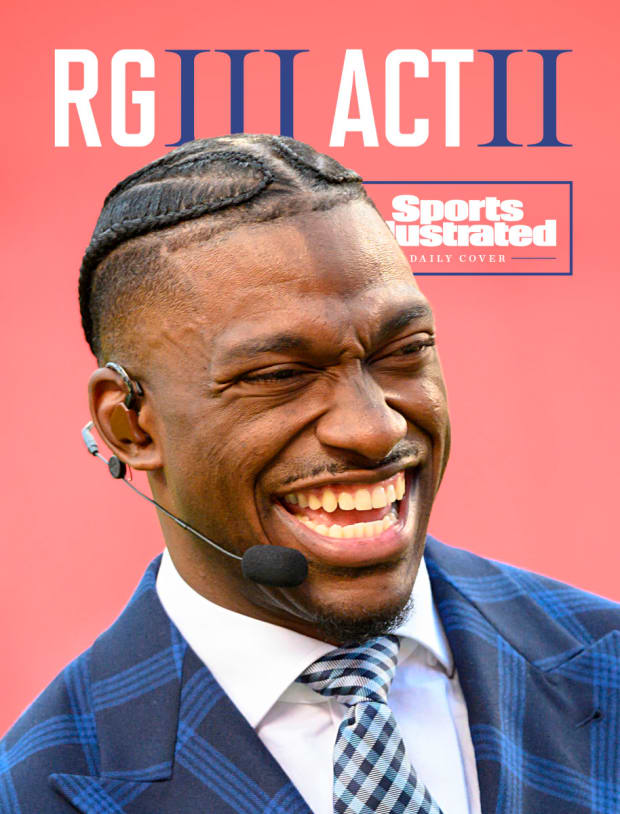
Reed Hoffmann/AP/Shutterstock
RGIII may well have been the most accomplished player and fittest athlete inside FBC Mortgage Stadium that afternoon. But he was there not to play football, but rather to broadcast it as ESPN’s analyst for this game between Cincinnati and Central Florida. And, in this MVP-caliber season he’s having, Griffin would turn in yet another dazzling performance.
This is RGIII in Act II, a breakout star, rocketing up ESPN’s depth chart. In this, his second season, he’s already revealed himself as perhaps the network’s single most insightful and incisive of football analysts—fun and funny and quick-witted and agile-minded, yes; but also reliably informative, hard-won as some of the knowledge and emotion has come.
Griffin marries substance with style and preparation with whimsy. He does what all the great analysts do and transports the viewers onto the field and into the huddle. He avoids the great athlete-turned-analyst pitfall of I-remember-from-back-when-I-was-playing tropes that are as boring as they are narcissistic. All the while, RGIII has nailed that Barkley-esque sweet spot for delivering unfiltered truth, without polarizing or drawing offense from the audience.
Says Griffin’s producer, Kim Belton: “I see him as, potentially, a generational talent. He has what the great ones have. I’m talking about the Maddens and the Vitales and the Ueckers. They realize, We’re gonna cover the game. But we have to let our personality shine through.”
And yet … for all the accumulating praise in this new line of work, Griffin doesn’t consider himself retired from his first job. At 32, he is still younger than eight quarterbacks currently starting in the NFL—including a certain 45-year-old who is playing barely an hour away. Griffin works out daily and keeps himself in playing shape. Literally and figuratively, he’s waiting for the phone to ring once more.
It’s all created this bit of irony: the ascending talent and promise RGIII betrays on football broadcasts and podcasts has soothed some of the wounds from an NFL career that didn’t go as planned. It’s also reinforced how much he wants to be back out there playing.
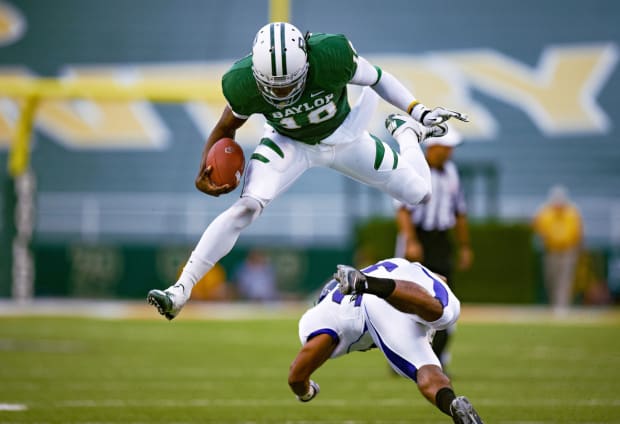
Greg Nelson/Sports Illustrated
The Ballad of RGIII hits both familiar and singular strains. Eleven years ago this autumn, he was the (Texas) toast of college football. As quarterback for Baylor, he confounded defenses with his cannon of an arm and the strong legs that enabled him to qualify for the Olympic trials in the 400-meter hurdles. He threw in straight lines, ran in curlicues, and seemed to set a new quarterbacking record with each new set of downs.
And all the while, he was—and is—ferociously original. Born in Japan, the son of two U.S. army veterans, RGIII mixed military precision and a sort of buttoned-up maturity with blazing charisma. He wrote and performed songs. He wore socks with capes attached. When he won the award, he delivered the most poignant and polished Heisman speech you will hear. As the Washington Post once put it, he possessed a “too-good-to-be-trueness.”
Before the 2011 Alamo Bowl, Griffin’s final college game, he spoke with Quint Kessenich, a reporter for ESPN. Kessenich recalls that Griffin’s magnetism was so obvious and pronounced and endearing that he kept a photo of the occasion. “I don’t hold onto stuff like that,” says Kessenich. “But there was something about him from that moment. … I just became a fan. There’s not that many players that can impact you based on a couple conversations.”
Picked second by Washington in the 2012 NFL draft, Griffin began his pro career auspiciously enough. With a $14 million signing bonus and a satchel of endorsement deals in hand, he started immediately and was September’s NFL Offensive Rookie of the Month. By mid-November, his team voted him offensive co-captain, making him the first rookie captain on a Mike Shanahan team. He responded with a four-touchdown passing game and a perfect 158.3 passer rating.
After that, the deluge. In a Week 14 game against Baltimore, Griffin was, memorably, hit squarely in his knee, and it twisted like the cap on a jar. In Washington’s wild-card playoff loss, Griffin gruesomely reinjured his knee and subsequently underwent surgery on both his LCL and ACL, causing him to miss the Pro Bowl.
He never regained traction. Following that promising, if bittersweet, rookie season, there were concussions. There were more leg injuries. There was disillusionment. And dented confidence. He and his first wife went through a messy, public divorce. He was benched. Washington fans didn’t just turn on him; they turned cruel—reverting to the mean, as it were—creating parody songs about his downfall. (To Elton John’s Candle in the Wind: “Goodbye RGIII / That was an unprecedented fall / You're still great at selling sandwiches / But not so good at football.”) Washington released him in 2016. A year in Cleveland didn’t exactly provide a reboot.
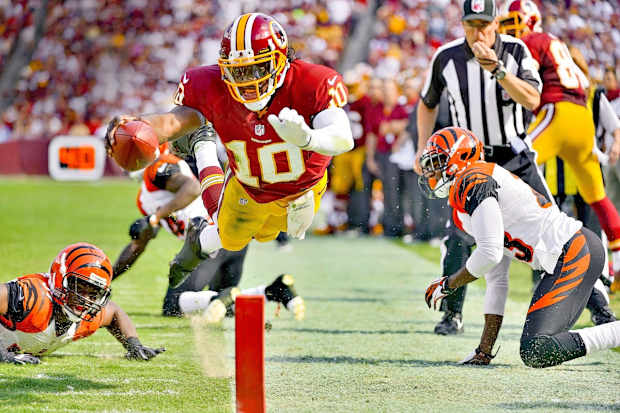
Simon Bruty/Sports Illustrated
By 2017, Griffin was out of football. He stayed in shape working out with his girlfriend, now wife, Grete—a former Florida State heptathlete—at the University of Miami track. After a series of 400-meter hurdles, Griffin says he collapsed on the ground in full body cramps. Grete came over and said, quite reasonably: “You’re not on a team right now; there’s no reason for you to be training this hard. Why are you doing this?” Griffin considered the question. Between gasps, he answered. “Because I love it.”
In 2018 he was on a new roster, the Ravens having picked him up to be a backup quarterback and, more important, a mentor to Lamar Jackson. RGIII went months without seeing the field and averaged 19 pass attempts per season from ’18 to ’20. But, as he puts it, “I got three more years out of my career, right?”
If Griffin were no longer the subject of pursuit, hot or otherwise, by NFL teams, he was being chased doggedly by a New York television agent. In the 90s, Mark Lepselter spotted broadcast talent in Tiki Barber, who possessed sports bona fides but also natural curiosity and charisma. After signing Barber—eventually getting him a spot on The Today Show—Lepselter built up a business that now exceeds 100 clients.
He spent years informally coaxing Griffin, encouraging him to “get reps” in front of the camera. When Griffin’s contract with the Ravens lapsed after the 2020 season, he finally relented. He went to Fox Studios in Los Angeles for an audition, calling a mock game and reading highlights for a mock halftime show. Griffin says flatly, “They were blown away.” (A Fox executive confirms this characterization.)
Then Griffin did the equivalent of fumbling the ball downfield, or so he thought. “I was on a call with ESPN and I didn’t know I wasn’t supposed to tell them I’d gone to an audition with Fox,” he says. “That was my fault.” ESPN promptly brought Griffin to Bristol. He called a taped game with Rece Davis and sat next to Laura Rutledge for a simulated studio show. He passed that audition, too, and signed a two-year contract.
A contrast with his NFL career, ESPN put Griffin in the best possible position to succeed. For a designated producer, Griffin was assigned Belton, a former basketball star at Stanford and a Suns draft pick. A well-regarded ESPN veteran, Belton knew firsthand about the transition to media after a sports career filled with exhilarating highs that didn’t quite max out on its promise. In the truck, Belton projects calm. He speaks to the booth sparingly; and when he does, he sounds less like a harried producer than a baritone late-night DJ on Smooth FM.
In the booth, ESPN paired Griffin with play-by-play man Mark Jones, a benign, upbeat presence who discharges his broadcast duties with an easygoing professionalism and a ready laugh. Jones is best known for his NBA work and, at age 60, he isn’t exactly gunning for promotions. Off camera, the two bond over their love of track and field, the benefits of being Florida residents (Jones lives in Miami) and their mutual fondness for all sports. On the air, theirs is a distinct chemistry, catalyzed mostly by Jones’s setting up his partner and getting the hell out of the way. The sideline reporter for the team, ironically, is Kessenich, the journalist who was so taken with Griffin’s force of personality from a decade prior that he kept a photo.
When Griffin made his debut last fall, he was, by his own admission, raw. He didn’t know how to use the telestrator. He didn’t know the tricks of T.V., adjusting voice timbre and swiveling to different cameras. He didn’t know the promo is not brought to you by Papa John’s but delivered by Papa John’s. That would all come soon enough.
But he did start the 2021 season with an organizing principle. He knew firsthand that media criticism doesn’t just sting athletes; it can reroute careers. “If you say something about a player that is not entirely true, those things can stick with that player for the duration of their career. I felt like I was one of those guys that had some stuff stuck to my name that wasn't representative of who I was or what I had done or the work I had put in,” he says. “When I came into this broadcasting role, I wanted to make sure I was being fair to everyone. I want to provide what broadcast TV is supposed to be—and that’s entertainment. But I’m never gonna provide entertainment at the cost of a player. Calling them lazy. Not hardworking. Not smart. Doesn’t put the time in. I’m not going to say that, unless I absolutely know it to be a fact.”
Multiple members of this current team suggest that Griffin’s media success has been therapeutic for him (their word) and redemptive following the drama (trauma?) of his NFL career. He pleads that down to lesser charges. “I’ve moved past all of the stuff from the past,” he says. “You have to learn from your mistakes. You have to learn from the things that you go through. And I don’t think if I [hadn’t gone] through what I did in Washington, that I would be where I am today. Not just [broadcasting]. It’s made me a better husband; it’s made me a better father. It’s made me a better player.”

The former players who think they can roll up to the booth, rely on their playing experience and simply talk about the action as it unfolds —“see-ball-hit-ball,” in T.V. speak—get weeded out fast. The best of the ex-jock analysts prepare for a broadcast as they would for a game. Griffin’s approach goes beyond even that.
He has his team get their assignments on Sunday. He spends three days watching film, reading a research packet, learning the personnel for East Carolina or the blitzing schemes for Colorado State. On Thursday, he travels—commercial, sometimes coach class—to games. (If it’s Thursday and you’re in the Atlanta airport, hey, odds are good you can get a selfie with a recent Heisman Trophy winner.) On Fridays, he’s on campus, meeting with players and coaches, picking up factoids and teams’ overall vibes, such as Cincinnati never truly recovering from its Week 1 loss to Arkansas, which squelched its national title ambitions.
Griffin also does plenty of on-camera work on campus before kickoff. In Michigan, for instance, he did a high-risk, low-reward live shot, walking through the famed Tunnel of the Big House. The day before the Cincinnati-UCF game, he took part in Spirit Splash, a homecoming tradition whereby UCF students sprint across a fountain. With a GoPro strapped to his chest, Griffin took off, showed off his speed … and then wiped out in the middle of the fountain.
On Saturday, three hours before kickoff, he was in a tent next to ESPN’s broadcast truck surrounded by his camera people, advising them how and when to shoot, and which players were most capable of making big plays. He then hopped aboard a golf cart and headed to the tailgating scene. Having tweeted out in advance that he would be making an appearance, Griffin was greeted like a (hungry) hero. One fan had made him a plate of barbecue brisket and grits, a nod to RGIII’s Texas past—and future; Griffin plans to move to Houston from Orlando after the season. Another offered him cornbread muffins. A third handed him a jar of moonshine, which he graciously declined.
Griffin has been struck by how much of the football experience—the flavor, the pageantry—eludes the players, himself included. Griffin points out that, until last season, he had always entered the stadium by private bus, headed to the locker and field, locked in on the game, and paid no attention to the tailgate scenes and the fight songs. “[As a player] you never get to see it from the fans’ perspective. The Spirit Splash? I guarantee, that’s something no player at UCF is ever going to be in. One, because coaches would be afraid they’re going to get hurt. Two, because they’re so focused.”
Even for late October, it was a punishingly hot Orlando day, and Griffin’s suit was soon soaked in sweat. Still, he played cornhole, dapped the UCF mascot and took enough selfies to stress the campus wifi. And it’s not just that he’s game. In weaker moments he’ll admit that, especially after his NFL experience, all the attention is good for the ego. Kids who were 10 years old when Griffin won the Heisman, they’re now 21 and happy to tell him how fondly they recall him. Fans who remember him from Madden or their fantasy line-ups are thrilled to see him in the flesh. “It’s like this every week,” says Brian McIntyre, Griffin’s camera person. “Everywhere we go.”
Much as Griffin wore those goofy socks in college—a gimmick perhaps, but one that differentiated him from his peers and made him relatable—he has drawn as much attention this season for the sexual innuendo and double entendres (and single entendres) he’s dropped into his commentary. In Week 1, Griffin called the Michigan–Colorado State game. When Wolverines freshman quarterback Alex Orji scored a late touchdown, Griffin could barely suppress his giggling before declaring: “It’s an orgy in the end zone.”
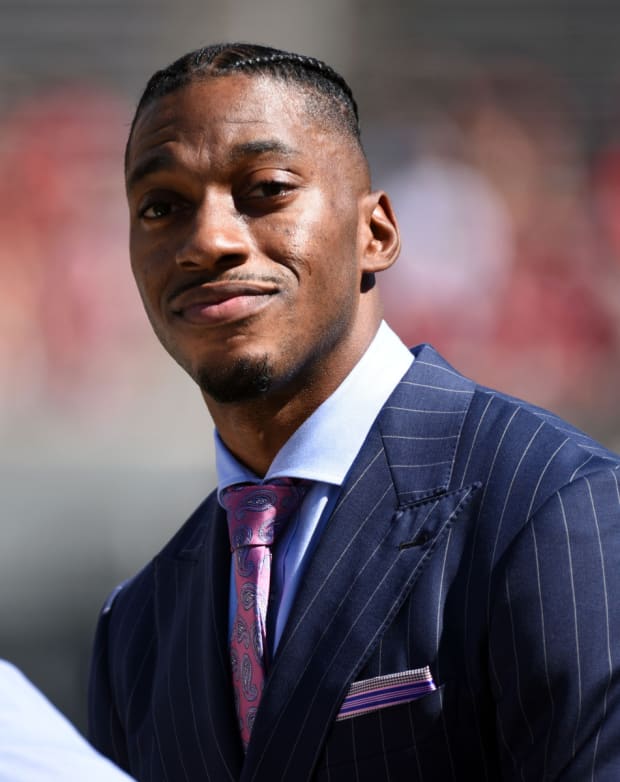
Rob Kinnan-USA TODAY Sports
Two weeks later, he called the Washington–Michigan State game. When the Huskies’ quarterback, Michael Penix Jr., threw for 397 yards and four touchdowns, Griffin declared this a display of “Big Penix energy.” In that same game, Griffin referred to a Michigan State offsides penalty as “premature snapulation.” Speaking of crossing the line … referencing Antonio Brown’s recently exposing his genitals in a hotel pool, after Seattle defeated Detroit 48–45, Griffin took to Twitter to note: “AB showed more D than the Seahawks and Lions did today.”
He knows the topic of his sexual references is coming—anticipating the blitz, as it were—and pre-empts the question. “It’s something on the spot. If anybody's noticed, the last three or four weeks, there haven't been any of those [sexual references]. And the reason is, it’s not what I plan to do; it’s not something calculated. I didn’t scour down Michigan’s depth chart and say, ‘Ooh, their third-string quarterback’s named Orji!’ ... But, Oklahoma has a quarterback named General Booty. What do you want me to call him? General B.? When he’s getting ready to go in the game, well, Booty’s getting loose on the sideline. Play into it. Have fun with it. But never play into it so much where it’s over the top, where people can’t watch the game because it’s too sexualized.”
Belton isn’t interested in suppressing Griffin’s instincts, but he’s aware that all the innuendo has some downside potential. “We talked to him and we just had to make sure that he realizes the consequences,” he said. “It might be funny, right? But there’s some people who might take offense.”
At the Bearcats-Knights game, there were no off-color jokes, but there were plenty of touches that distinguished Griffin. The first half of the game was a brutal watch, but Griffin did his best to compensate for the game’s lack of entertainment. Belton rolled in the video of Griffin wiping out during the Spirit Splash. Griffin tagged the story by recalling that he had lost his wedding ring in the process, which, he joked, was found by a marriage-preserving undergrad.
Griffin also told the story of being recruited by UCF coach Gus Malzahn when Malzahn was the head coach at Tulsa. Griffin declined the pitch because he figured Malzahn was a coach on the make and wasn't long for central Oklahoma—which was correct, as Malzahn left Tulsa for Auburn in 2009. (Griffin didn’t squeeze off an even better story, one he told off-air, of being recruited by Stanford coach David Shaw. When Griffin visited The Farm and was assigned to room with Richard Sherman, he was turned off, taking it as a sign that Stanford would try to convert him from quarterback to defensive back.)
In the second quarter, UCF quarterback John Rhys Plumlee collided violently with the Cincinnati defender, rose haltingly, stumbled on the field and was then taken out of the game with a concussion. Choosing his words carefully, Griffin resisted two broadcaster impulses, neither minimizing the trauma nor speculating about the severity of the hit in the injury.
The second half was unrecognizable from the first, stuffed as it was with big plays, turnovers, questionable play-calling. Griffin adjusted accordingly, lifting his energy in proportion to the game. When a Cincinnati receiver caught a pass and stared at the UCF secondary, Griffin laughed as he guessed at what was said: “Listen here, buddy: You can’t cover me.” Griffin sang. Someone had “thickums” for legs. He gesticulated as he spoke. He broke down plays.
Here’s how he put it to me during a break in the action: “Want to know my philosophy? I teach my daughter the alphabet and I know the difference between G and H. I know all sorts of words that start with G and H. But they don’t. And it’s about them, not me. Same with football. How does it help the audience for me to show off how much I know? I need to make it relatable to them.”
With afternoon bleeding into evening, Belton got in Griffin’s ear and remarked, “Man, look at that sunset.” Lesser broadcasters would simply have parrotted the line. When a UCF receiver dropped a pass, Griffin said, “Maybe he dropped that pass because he was distracted by that beautiful sunset.”
Which is not to say that it was a flawless day. When Cincinnati defensive lineman Noah Potter jumped offsides, Griffin dad-joked, “Potter was a little too excited to get to Gryffindor,” a clunker that got no laugh out of Mark Jones. At one point, Griffin started a story about his team meeting with Cincinnati’s coordinators. But he took too long with the wind-up and had to wait for a play to elapse before concluding it awkwardly. As is the case on every broadcast, there were plenty of elements—researched factoids, footage from RGIII at the tailgate, an anecdote about the singing prowess of Cincinnati lineman Jowon Briggs—that didn’t make air. So it goes.
In the end, Central Florida, riding its backup quarterback, won 25–21, to the delight of the homecoming crowd. While there was no scoreboard to remove all doubt or subjectivity, it was, by any measure, a win for Griffin and the ESPN team, too. It was a fun, wacky, arrhythmic game. The broadcast conveyed as much. Social media approved. Of the viewership of 1.059 million—solid, given the time slot and the teams—it’s hard to imagine most didn’t leave a) entertained or b) slightly more knowledgeable about football.
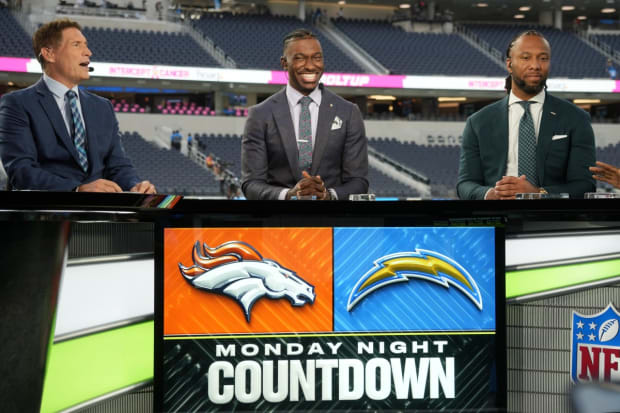
Kirby Lee-USA TODAY Sports
Like any team, this one benefits from the presence of a hot star. Owing largely to Griffin’s rise, his entire T.V. crew is getting increasing attention and increasing choice games. This Saturday, they will work at the Big House once again, as No. 3 Michigan plays Nebraska. From Belton to Jones to Kessenich to the camera and tape operators—sports T.V.’s equivalent of the faceless but indispensable linemen—they are all enjoying the ride with RGIII. And he, too, is benefiting. Complicating his travel but raising his profile, before this NFL season, Griffin was promoted to ESPN’s Monday Night Countdown replacing Randy Moss. When his current deal lapses, he’ll likely be rewarded accordingly with a multi-year deal—a notion, yes, dropped by his agent, but confirmed internally.
Griffin says he’d like to be in media “for the next 30 or 40 years.” But there are grander, vaulting ambitions. “As a player you, to get into the Hall of Fame, right? You want to win Super Bowls. What is that for a broadcaster there? You really don’t know. If I have an opportunity to impact the game and become a Hall of Fame broadcaster, that would be incredible. But that’s not the end-all, be-all. I had this conversation with my family before I had stepped foot in the booth for the first time last year. The end goal for me is to be able to travel around the world and help people where they’re at.”
How, specifically? “Food insecurity, building orphanages or helping people access water. At some point you have enough money and, and it’s time to go out there and give back and help people in a special way.”
Likewise, when the NFL franchise that drafted him entered the sales process last week, Griffin saw it as both a news story and an opportunity. “We knew that [owners Dan and Tanya Snyder] didn’t wanna change the name; they changed the name. And we knew they didn’t wanna sell the team, and now it looks like they could be selling the team,” he says. “I know the fans have wanted this for a long time. … I don’t have billions in my bank account, but I would love to be a part of an ownership group and add diversity.” He says that he’s already spoken to other potential owners, including Jeffrey Wright, Kevin Durant, Matthew McConaughey and Dale Earnhardt Jr.
But all that can wait. There’s another college assignment coming for the following Saturday and two new teams to deconstruct. Asked how he reconciles his ascendant broadcast career with his persistent NFL ambitions as a player, the broadcasting revelation of this football season sighs. For someone so extraordinarily glib and quick-witted on the air, he had to go prospecting for the words. He starts. He false starts. Finally, he lands here:
“I’m a 32-year-old young man who loves the game of football. If the right call comes about, and it’s the right situation, I will be ready to play. I know what it takes to be ready. I make sure I stay ready because a ready man doesn’t have to get ready. He stays ready. As a broadcaster, I’m having a blast. As a player, I would still love to play. But I’m not going to let one goal get in the way of the other. They can both work simultaneously.”







